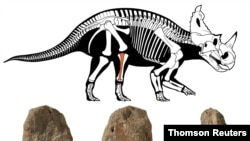Canadian researchers have discovered the first known case of cancer in a dinosaur, according to a study published in the August issue of the scientific journal The Lancet Oncology.
A leg bone from a Centrosaurus was discovered by paleontologists in 1989 in the Canadian province of Alberta.
Experts initially believed that the deformed bone had suffered a fracture that healed.
But recent examinations, under a microscope and using advanced technologies, such as high-resolution tomography, revealed that a lump on the bone, the size of an apple, was in fact a cancerous tumor.
"The dinosaurs did not have an easy life, many of them had healing fractures, or bone infections," one of the study's authors, Mark Crowther, told AFP.
On such ancient bones, "finding evidence of cancer is difficult", he emphasizes: most tumors develop in soft tissue, poorly preserved by fossilization.
Fine analysis of the bone of the prehistoric herbivore revealed a surprise: “oddly, under the microscope, it looked a lot like human osteosarcoma,” a malignant tumor of the bones, says Crowther.
"It's fascinating to see that this cancer existed tens of millions of years ago and still exists," notes the researcher, who heads the faculty of medicine at McMaster University in Ontario.
The tumor of this Centrosaurus, a horned herbivore that lived 76 to 77 million years ago, probably caused metastases that made this giant lizard limp, say the study's authors.
However, the researchers believe that it was not this cancer that killed the Centrosaurus: the bone of its leg was found among a hundred bones in the same herd, probably swept away by a sudden disaster, such as a flood.
“The discovery of this cancer makes dinosaurs more real,” says Crowther. "We often imagine them as mythical creatures, walking with a heavy and robust step, but (...) they suffered from diseases like humans."
"By discovering an example dating back more than 75 million years, we realize that (cancer) is part of life," he concludes. "You have an animal that surely did not smoke, so this shows that cancer is not a recent invention, and that it is not exclusively linked to our environment."




